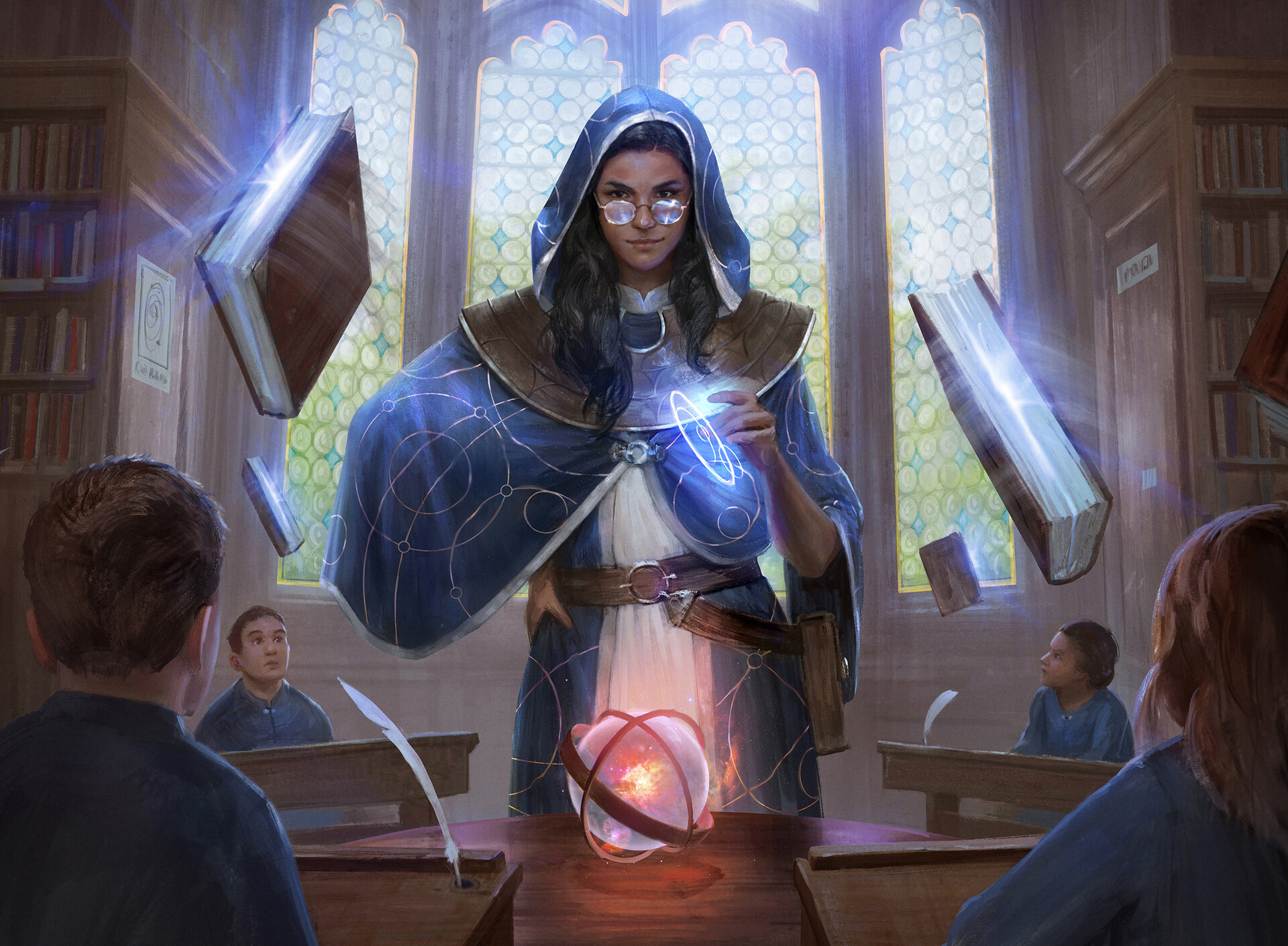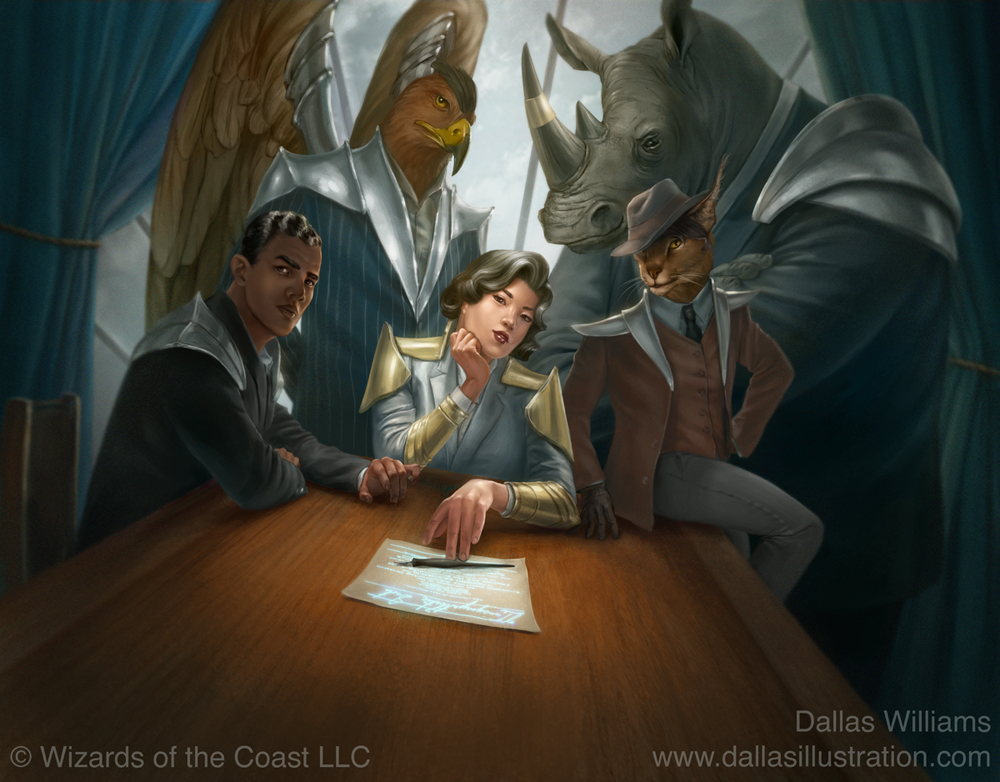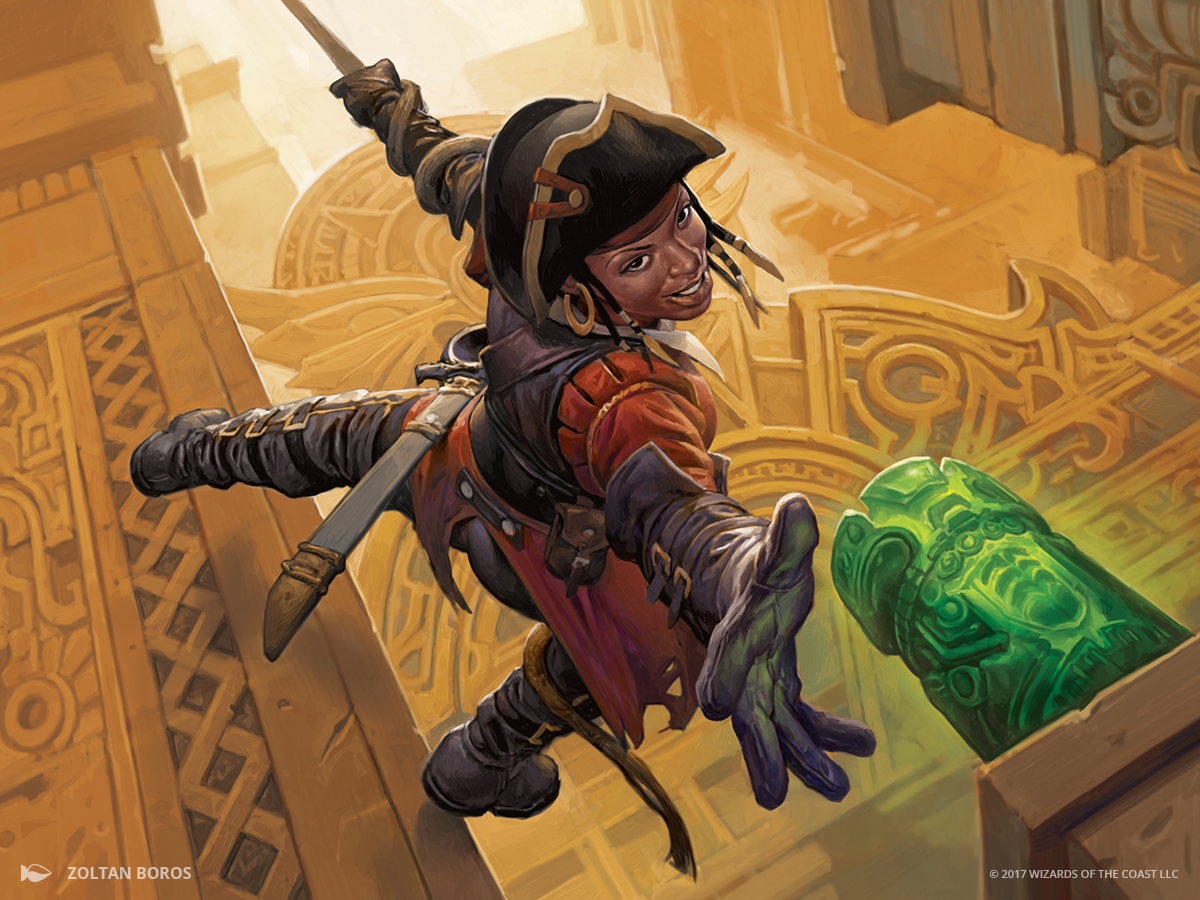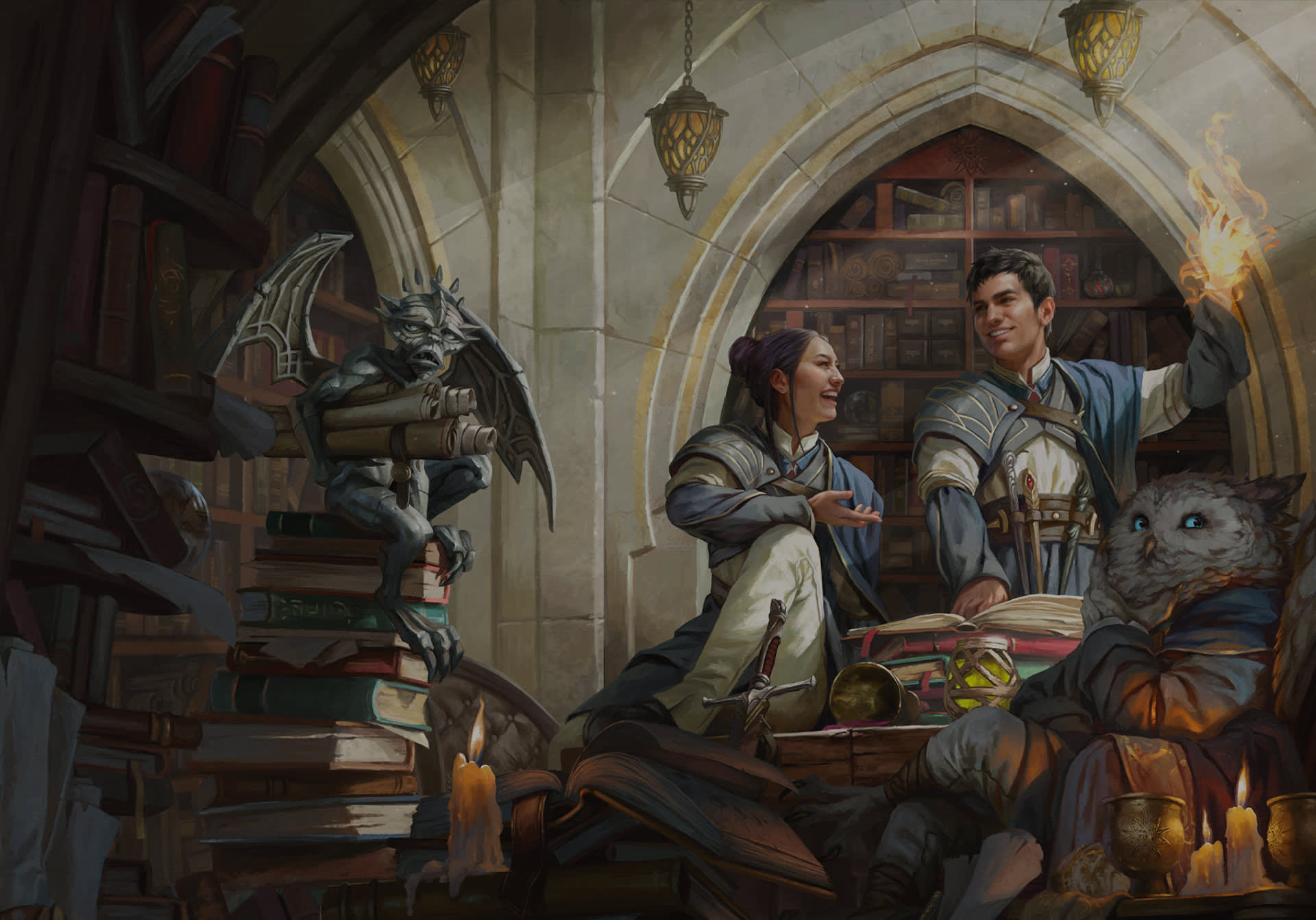






![]()
Scholar
A cloud of dust filled the air as the young half elf dropped the huge tome on the table. She knew the answers were in there somewhere, waiting for her... She just had to get to them in time, before the kingdom fell into ruin.
A leonin puffed his pipe and looked at a small note found in the victim's pocket - the only real clue in the case he tried to solve. He checked it from side to side, again and again, but still found nothing.... With a sigh, he placed the piece of paper on the desk, then picked it up almost immediately. Where had he hidden it, where... Yes! He placed the note right next to the letter from the client - indeed, the handwriting matched... Leonin growled with satisfaction and smiled, for he knew who the murderer was.
The hulking half orc hunched over a stack of notes, again and again scribbling on the paper with his quill. After a minute of non-stop writing, he smiled sincerely. Finally, he figured out how to finish his book - his Opus Magnum - and what an ending it was...
These scholars have one thing in common - a natural desire to acquire knowledge. Some of them prefer to search for it in old libraries and even older tomes, while others travel tirelessly to find it in ancient temples and lost cities. In the end, however, their goal is the same - to learn as much as possible about the world within the span of one short lifetime.
Life Among Dusty Tomes?
The scholar is usually portrayed as an elderly person, hunched over a dusty volume. While this is sometimes the case, many scholars are the complete opposite of this stereotype. They seek knowledge outside libraries - in ancient ruins, in forgotten cities, and in the archives of lost civilizations. It's still a dusty life, but it's certainly not mundane!
The Pursuit of Knowledge
A true scholar's appetite for knowledge is never satisfied... After all, there is always something new to discover! This is why many of these usually withdrawn people seek a life of adventure, because nothing teaches better than a life of danger.
Multiclassing and the Scholar
If your group uses the optional rule on multiclassing, here's what you need to know if you choose Scholar as one of your classes.
Ability Score Minimum: As a multiclass character, you must have at least an Intelligence score of 13 to take a level in this class, or to take a level in another class if you are already a Scholar.
Proficiencies Gained: If Scholar isn't your initial class, here are the proficiencies you gain when you take your first level as a Scholar: simple weapons, one skill of your choice.
Scholar
| Level | Proficiency Bonus |
Features | Intense Study Points |
|---|---|---|---|
| 1st | +2 | Analytic, Unarmored Defense |
- |
| 2nd | +2 | Appraisal, Intense Study | 2 |
| 3rd | +2 | Academic Pursuit, Discovery |
3 |
| 4th | +2 | Ability Score Improvement | 4 |
| 5th | +3 | Extra Action | 5 |
| 6th | +3 | To Fight Someone is to Know Them, Calculated Prediction |
6 |
| 7th | +3 | Always Ready | 7 |
| 8th | +3 | Ability Score Improvement | 8 |
| 9th | +4 | Academic Pursuit | 9 |
| 10th | +4 | Discovery | 10 |
| 11th | +4 | Hyperawereness | 11 |
| 12th | +4 | Ability Score Improvement | 12 |
| 13th | +5 | Academic Pursuit | 13 |
| 14th | +5 | Rigorous Control | 14 |
| 15th | +5 | Passive Scrutiny | 15 |
| 16th | +5 | Ability Score Improvement | 16 |
| 17th | +6 | Academic Pursuit | 17 |
| 18th | +6 | Mind Palace | 18 |
| 19th | +6 | Ability Score Improvement | 19 |
| 20th | +8 | Scholar of the Ages | 20 |
Class features
As a scholar, you gain following class features.
Hit Points
- Hit Dice: 1d8 per scholar level
- Hit Points at 1st Level: 8 + your Constitution modifier
- Hit Points at Higher Levels: 1d8 (or 5) + your Constitution modifier per scholar level after 1st
Proficiencies
- Armor: None
- Weapons: Simple weapons, hand crossbows, shortswords
- Tools: Two types of artisan’s tools of your choice
- Saving Throws: Intelligence, Wisdom
- Skills: Choose any three
Equipment
You start with the following equipment, in addition to the equipment granted by your background:
- (a) a shortsword
- (a) a hand crossbow and 20 bolts or (b) four daggers
- (a) a scholar's pack or (b) an explorer's pack
Quick Build
First, make Intelligence your highest ability score. Your next-highest score should be Dexterity. Second, choose the sage background.
Analytic
Your analytic capabilities allow you to prepare for anything that world throws at you. You gain the following benefits:
- When you use your reaction to make an attack, you can use your Intelligence modifier, instead of Strength or Dexterity, for the attack and damage rolls.
- When you take the Ready action on your turn, you can prepare one additional action as a bonus action. If these actions are made outside your turn and have the same trigger or use the domino effect, you can make them as part of the same reaction.
Unarmored Defense
While you are wearing no armor and not wielding a shield, your AC equals 10 + your Dexterity modifier + your Intelligence modifier.
Appraisal
Using your vast knowledge, you are usually able to decipher the properties and lore of an ancient items. At 2nd level, you can cast the Identify spell, without using a spell slot or material components, but you can use it only on objects. When casted this way, you can also determine the place of origin of the assessed item, its approximate age and estimate its value.



Multiple Ready actions?
The Scholar's multiple Ready action economy can be used in three ways:
- Different triggers. You can set different triggers for each action. Example here would be: "If the cultist steps on the trapdoor, I'll pull the lever that opens it BUT if anyone steps next to me, I move away." Each action costs a reaction, so you can prepare for both scenarios, but you need two reactions to be able to use them.
- Same trigger. You can set multiple Ready actions under the same trigger. Example here would be: "If the goblin steps next to me, I use the Disengage action AND move away from it." These actions use the same trigger, so you can make them as part of the same reaction.
- Domino effect. You can set multiple Ready actions as a chain reaction. Example here would be: "If the goblin moves towards me, I throw oil at it. IF I hit the goblin, I set the oil on fire." These actions use the domino effect, so you can make them as part of the same reaction, provided you make them in the same turn.
Intense Study
By 2nd level, you possess a vast knowledge of many things, which allows you to approach any topic from different angles. This knowledge is represented by Intense Study points. Your Scholar level determines the number of points you have, as shown in the Intense Study column of the Scholar table.
You can spend these points to fuel various features. You start knowing three such features: Smart Approach, Expert Knowledge and Keen Mind. You learn more features as you gain levels in this class.
When you spend a point of Intense Study, it is unavailable until you finish a short or long rest.
Smart Approach. When you make an ability check, you can spend 1 point to use your Intelligence modifier instead of any other modifier.
Expert Knowledge. When you add your proficiency bonus to an ability check, you can spend 1 point to double your proficiency bonus for that roll.
Keen Mind. When you prepare the Ready action on your turn, you can spend 1 point to gain one additional reaction. This reaction can be used only to trigger an action you've prepared using the Ready action.
Academic Pursuit
At 3rd level, you choose which type of research you want to devote yourself to. Your pursuit choice grants you features at 3rd level and then again at 9th, 13th, and 17th level.
Discovery
Also at 3rd level, you learn one language of your choice. Additionally, you gain proficiency in two skills or tools of your choice.
At 10th level, you learn an additional language of your choice. You also gain proficiency in two skills or tools of your choice.
Ability Score Improvement
When you reach 4th level, and again at 8th, 12th, 16th, and 19th level, you can increase one ability score of your choice by 2, or you can increase two ability scores of your choice by 1. As normal, you can’t increase an ability score above 20 using this feature.
Extra Action
Beginning at 5th level, you can prepare two actions, instead of one, whenever you take the Ready action on your turn. If these actions are made outside your turn and have the same trigger or use the domino effect, you can make them as part of the same reaction.
To Fight Someone is to Know Them
You are an expert in studying your foes in conflict, learning how they think and gleaning secrets from them based on how they move, attack, and defend. Starting at 6th level, when you hit a creature with an attack or succeed on an ability check against it, you can spend up to a number of Intense Study points equal to half your proficiency bonus (rounded down) to learn certain information about the creature's capabilities. For each point, you can ask the DM one of the following questions:
- What creature is it?
- What type of a creature is it?
- What alignment does it have?
- Is it vulnerable to a certain kind of damage?
- Does it resist any types of damage?
- Does it resist any types of conditions?
- Does it know about my presence?
- Does it have a prominent personality trait?
- Does it conceal something?
- How can it harm me?
- Can it use magic?
The DM answers truthfully, but you must be able to deduce that information. If you wouldn't have the knowledge necessary to acquire the information, the DM can give you a vague clue instead of a hard fact, or can state that you simply wouldn't be able to gain this information.
Additionally, when you analyze the target, you gain the following benefits:
- Choose one ability. You have advantage on ability checks made with the chosen ability against the target.
- You gain a bonus to damage rolls against the target. The bonus equals your proficiency bonus.
This benefit lasts for 1 minute or until you use this feature against a different target.
Calculated Prediction
Using the facts and events you have memorized and your ability to process information, you can attempt to predict the outcome of the upcoming events. Also at 6th level, you can cast the Augury spell, without using a spell slot or material components.
Always Ready
From 7th level, almost nothing can catch you off-guard. You can add your proficiency bonus to initiative rolls.
Additionally, if you are surprised at the beginning of combat and aren't incapacitated, you can use the Ready action on your first turn.
Hyperawereness
By 11th level, your training has honed your awareness to an incredible degree, allowing you to notice opportunities too small for others to perceive. You can take two reactions during the combat instead of one. This second reaction can be used only to trigger an action you've prepared using the Ready action.
Rigorous Control
You maintain control over yourself when you cannot control anything else. Starting at 14th level, when you fail an ability check, attack roll or a saving throw, you can use your reaction to reroll the die. You must use the new result.
Passive Scrutiny
By 15th level, your wits allows you to instantly see through an enemy. When you roll initiative, you may ask one question of the DM as if you'd spent a point on To Fight Someone is To Know Them.
Mind Palace
You have exceptional recall and can reconstruct events and places you have experienced or read about. Starting at 18th level, you can cast the Legend Lore spell, without using a spell slot or material components.
Scholar of the Ages
By 20th level, your skill and intellect are widely known and respected. Your proficiency bonus increases by 2, up to a maximum of 8.
Academic Pursuits
| Section | Page Number |
|---|---|
| Writer | 6-7 |
| Investigator | 8 |
| Archeologist | 9 |


Academic Pursuits
There are many courses of study in higher education, as there are a lot of things yet to discover. Academic pursuit you choose reflects what type of qualifications you strive to acquire.
Writer
Some people don't need insane amounts of magical power to create a new world - some require only a piece of paper and a quill.
A Writer is a person that has perfected the written word in all of its glory. They produce different forms of literary art such as novels, books, plays and poetry, as well as reports and news articles. Talented writers often make significant contributions to the culture of society, and their work makes them immortal as long as there are people willing to reach for their books.
Bonus Proficiency
When you choose this academic pursuit at 3rd level, you gain the following benefits:
- You gain proficiency in calligrapher's tools and one gaming set of your choice.
- You learn two languages of your choice.
In addition to these benefits, you gain proficiency in one skill corresponding to the literary genre of your choice:
Mystery. You gain proficiency in Deception skill. If you are already proficient in it, you gain proficiency in a different skill of your choice.
In addition, your proficiency bonus is doubled for any ability check you make that uses Deception.
Horror. You gain proficiency in Intimidation skill. If you are already proficient in it, you gain proficiency in a different skill of your choice.
In addition, your proficiency bonus is doubled for any ability check you make that uses Intimidation.
Poetry. You gain proficiency in Performance skill. If you are already proficient in it, you gain proficiency in a different skill of your choice.
In addition, your proficiency bonus is doubled for any ability check you make that uses Performance.
Journalism. You gain proficiency in Persuasion skill. If you are already proficient in it, you gain proficiency in a different skill of your choice.
In addition, your proficiency bonus is doubled for any ability check you make that uses Persuasion.
Wordsmith
Starting at 3rd level, you learn how to inspire people through your craft. As an action, you can choose one creature other than yourself within 30 feet of you who can hear you. That creature gains an Inspiration.
You can use this feature a number of times equal to your Intelligence modifier (a minimum of once). You regain any expended uses when you finish a long rest.


Influential Persona
By 9th level, your work has become quite recognizable. Choose the social class that is particularly fond of your craft. You gain the following benefits based on your choice:
Upper class. You are welcome in high society, and other people of high birth treat you as a member of the same social sphere. You can secure an audience with a local noble or invitation to a ball if you need to.
In addition, you, as well as any creature you vouch for have advantage on Charisma checks made to interact with a person from the upper class.
Middle class. Your name is sufficient to cover most of your expenses; the inns, taverns, and festhalls are glad to welcome you. This advantage enables you to live a comfortable lifestyle without having to pay 2 gp a day for it, or reduces the cost of a wealthy or aristocratic lifestyle by that amount.
In addition, you, as well as any creature you vouch for have advantage on Charisma checks made to interact with a person from the middle class.
Lower class. Commoners will extend you every courtesy and do their utmost to help you. Unless you have shown yourself to be a danger to them, they will even take up arms to fight alongside you, should you find yourself facing an enemy.
In addition, you, as well as any creature you vouch for have advantage on Charisma checks made to interact with a person from the lower class.
Inspiration?
The inspiration mechanics are detailed in the Player's Handbook (p.125)
If your DM uses inspiration as a reward, you can freely separate DM's and Writer's inspiration as two different mechanics.
Legendary Scribe
Beginning at 13th level, you gain a benefit corresponding to the literary genre of your choice. You can choose the same genre you selected at 3rd level or a different one:
Mystery. Your senses are almost impossible to foil. As an action, you sense the presence of illusions, shapechangers not in their original form, and other magic designed to deceive the senses within 30 feet of you, provided you aren't blinded or deafened. You sense that an effect is attempting to trick you, but you gain no insight into what is hidden or into its true nature.
Horror. You quickly regain composure whenever something frightens you. You can use your action to end one effect on yourself that is causing you to be frightened.
Poetry. You can deeply move others through stirring words of your poetry. A creature that uses your Inspiration to make a roll with advantage can reroll one of the dice once.
Journalism. You're really hard to manipulate. You can use your action to end one effect on yourself that is causing you to be charmed.
Surge of Inspiration
Starting at 17th level, when you make an ability check, attack roll or saving throw, you can expend one point of Intense Study to make that roll with advantage.


Investigator
The world is full of mysteries, and the Investigators are the ones willing to reveal the truth hiding from the plain sight.
The Investigators collect information to solve crimes by talking to witnesses and informants, collecting physical evidence, or searching for records in databases. Their main goal is always clear - to arrest the criminal and enable them to be convicted for their crimes.
Private Detective
When you choose this academic pursuit at 3rd level, you gain the following benefits:
- You gain proficiency with heavy crossbows and longswords.
- You gain proficiency with the disguise kit, thieves' tools, and one gaming set of your choice.
- You learn thieves' cant, a secret mix of dialect, jargon, and code that allows you to hide messages in seemingly normal conversation. In addition, you understand a set of secret signs and symbols used to convey short, simple messages, such as whether an area is dangerous or the territory of a thieves' guild, whether loot is nearby, or whether the people in an area are easy marks or will provide a safe house for thieves on the run.
In addition to these benefits, you gain proficiency in Investigation skill. If you are already proficient in it, you gain proficiency in a different skill of your choice.
Moreover, your proficiency bonus is doubled for any ability check you make that uses Investigation.
Fighting Style
At 3rd level, you adopt a particular style of fighting as your specialty. Choose one of the following options. You can't take a Fighting Style option more than once, even if you later get to choose again.
Archery
You gain a +2 bonus to attack rolls you make with ranged weapons.
Dueling
When you are wielding a melee weapon in one hand and no other weapons, you gain a +2 bonus to damage rolls with that weapon.
Unarmed Fighting
Your unarmed strikes can deal bludgeoning damage equal to 1d6 + your Strength modifier on a hit. If you aren't wielding any weapons or a shield when you make the attack roll, the d6 becomes a d8.
At the start of each of your turns, you can deal 1d4 bludgeoning damage to one creature grappled by you.
Dangerous Fieldwork
By 9th level, you have acquired knowledge that allows you to infiltrate any crime syndicate. You gain the following benefits:
- You know where to find the criminal element wherever you go. You must spend one day to contact the criminal underworld or black market (as long as there is one in that area). If you also spend 25 gp to bribe your informants, you reach a contact without raising any suspicion.
- You can blend into the criminal underbelly. You must spend seven days and 25 gp to establish connections and to create a fake identity. Thereafter, if you adopt the new identity as a disguise, other creatures believe you are part of the organization you're trying to infiltrate, until given an obvious reason not to.
Connect the Dots
At 13th level, your deductive skills allow you to connect the dots. As an action, you can ask the DM one question. The DM answers it with one word, such as yes, no, maybe, never, irrelevant, unclear (if you wouldn't be able to deduct this information). If a one-word answer would be misleading, the DM might instead offer a short phrase as an answer.
You can use this feature a number of times equal to your Intelligence modifier (minimum of once), and you regain all expended uses of it when you finish a long rest.
The Long Goodbye
You became an expert in avoiding gruesome death. At 17th level, when you are reduced to 0 hit points, you can expend one point of Intense Study to drop to 1 hit point instead.




Archeologist
The world is full of long-forgotten places that - to this day - harbor incredible secrets of days gone by. Given this, it is only natural that there are people who seek out these places to unearth them, bringing their secrets to light.
These people, known as Archaeologists, dedicate their lives to uncovering as many ancient mysteries as possible. They can be found wherever there are secrets to be uncovered - no matter if it's the ruins of a minor village or the ancient temple of a forgotten god.
Vagabond Historian
When you choose this academic pursuit at 3rd level, you gain the following benefits:
- You gain proficiency with whips.
- You gain proficiency with the mason's tools and potter's tools.
- You learn one language of your choice.
In addition to these benefits, you gain proficiency in History skill. If you are already proficient in it, you gain proficiency in a different skill of your choice.
Moreover, your proficiency is doubled for any ability check you make that uses History.
Ancient Linguistics
Your knowledge of the ancient alphabets and dead languages allows you easily decipher the meaning behind any message.
Starting at 3rd level, you understand the literal meaning of any spoken language that you hear. You also understand any written language that you see, but it takes about 1 hour to decipher one page of text. If the text includes a secret message or a glyph, such as arcane sigil, that isn't part of a written language, the DM might provide you with a vague idea of its meaning.
Tradition of Armaments
Your research into ancient cultures gives you a vague idea of why the weapon was created and how it should be handled. Also at 3rd level, when you appraise a weapon using the Identify spell, you can choose to analyze it deeply, including the way it should be used. If you do so, you are considered proficient with that weapon, even if you lack proficiency with it.
This benefit lasts until you use this feature on a different weapon.
Trap Expert
Countless hours spent in the most dangerous places allows you to see the recurring patterns found in all of them.
Starting at 9th level, you sense the presence of any trap that is within your line of sight. For the purpose of this ability, a trap is anything that would inflict a sudden or unexpected effect you consider harmful or undesirable. Thus, you can sense an area affected by the alarm spell, a glyph of warding, or a mechanical pit trap, as well as natural weaknesses in the floor, an unstable ceiling, or a hidden sinkhole.
Artifact Expert
By 13th level, your knowledge of various ancient devices gives you insight into how to use them properly. You ignore all class, race and level requirements when using magical items you have appraised using the Identify spell.
Unearthed Knowledge
Starting at 17th level, you can use your Intense Study points instead of the charges on a magical item. The number of points needed to replace a charge depends on the rarity of the item.
| Item rarity | Intense Study points |
|---|---|
| Common | 1 |
| Uncommon | 2 |
| Rare | 3 |
| Very Rare | 4 |
| Legendary | 5 |





The Scholar
By zaelos_3
Art Credits:
Cover: Chase Stone - Odric, Lunarch Marshal
Page 1: Copyright: ©Wizards of the Coast LLC.
Page 1 (City): Alayna Lemmer-Danner - Azorius Island
Page 2: Drew Baker - Azorius Guildgate
Preview / Page 4: Bram Sels - Teferi's Protege
Page 5: Justine Cruz - Darviel, Soul Broker
Page 6: Magali Villeneuve - Glacian the Powerstone Engineer
Page 7: Dallas Williams - Brokers Ascendancy
Page 8: Zoltan Boros - Dire Fleet Daredevil
Last Page: Copyright: ©Wizards of the Coast LLC.
Page Textures: /u/flamableconcrete
Created Using: GMBinder